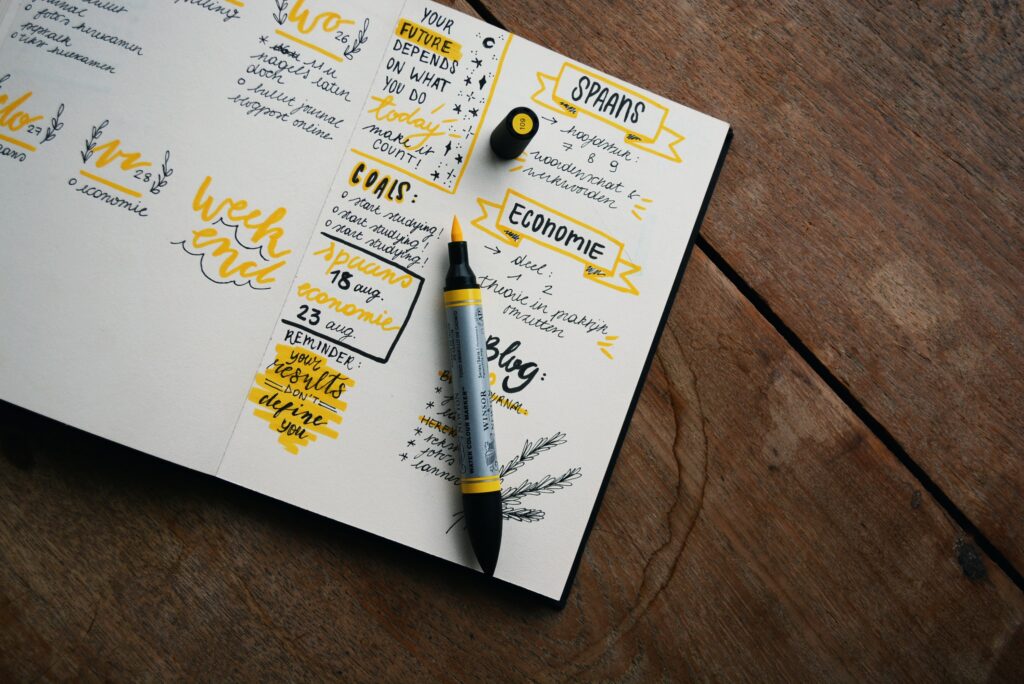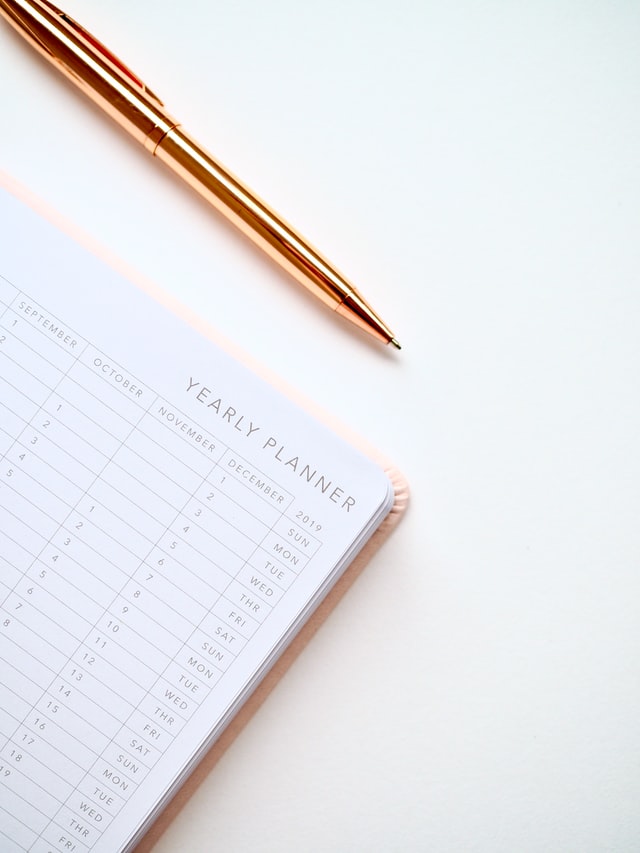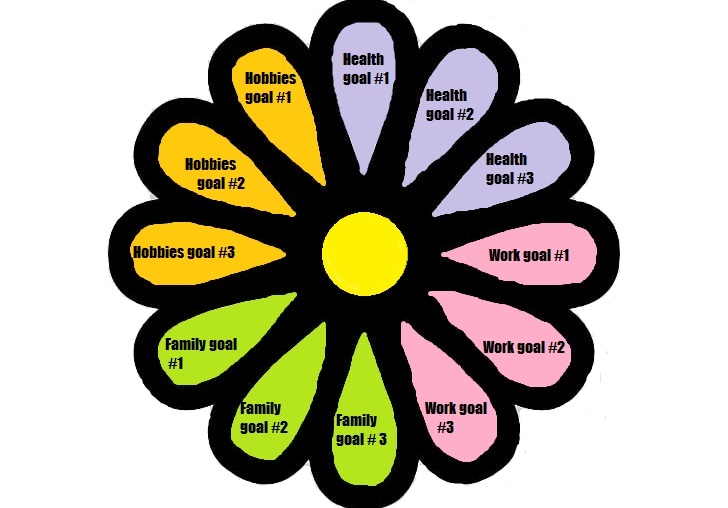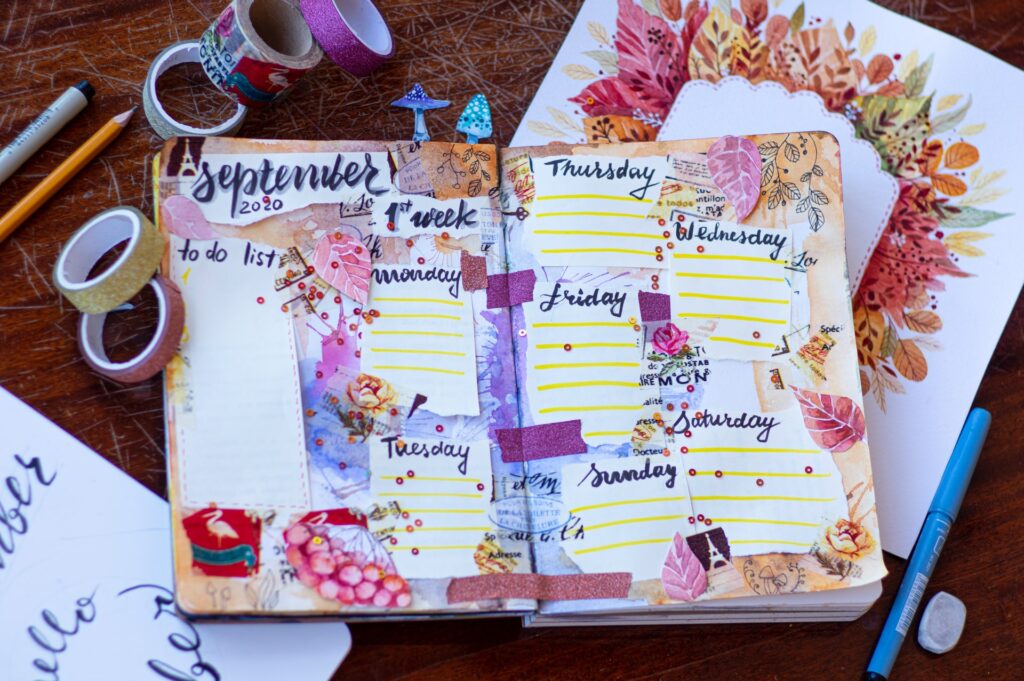
We all want to make the most of our time. If you manage to achieve everything in time, you’re doing great, congrats! But if you feel that you lack some time management skills, read on!
A word of caution first: this is a pretty long article. But I hope you’ll benefit from the time you spend on reading it.
There are many time management techniques and approaches, so I’ll only mention those that work for me. That does not necessarily mean they would work for you, but you might become more organized in the end.

1. Planning
What do you start with if you want to become more organized? A plan! It seems obvious, but some people neglect making plans, because it takes time. However, I found proper planning extremely effective.

1.1. Long-term planning
Let’s start with long-term planning. I pick 12 goals for the year. Since I tend to work more than I should, I divide them into four categories: Work, Family, Hobbies and Health. This makes 3 goals per category and helps balance all major plans. There is a great way to visualize these goals: make a flower out of cardboard paper! Cut out a circle for a center and twelve petals for each goal, picking a different color for each category. It might look something like this:

If you have small kids, get them to help you. They will love it! And you will also feel more responsible to reach your goals. This trick is great in many ways: for example, as you tear away the petals with achieved goals, you will see which aspects of your life need more attention. You can also evaluate your time management skills: if you reach all 12 goals within 6 months, you’re doing great! Otherwise some improvement would help.
It is also important to remember that your goals need to be SMART. You’ve probably heard it before, so here is a quick reminder. SMART stands for Specific, Measurable, Achievable, Relevant and Time-limited. If your goals don’t have these characteristics, they will be very difficult to achieve. For example, learning a new language is not a SMART goal, but finish my Spanish textbook in seven months is.

1.2. Monthly planning
But that’s not all of it. I also take these 12 major goals and add a couple more (like paying taxes, renewing software subscriptions or paying for domain and hosting services) and write down what I am going to do each month. This takes only two sheets of paper that you can pin to the wall alongside your flower. By ticking or crossing out the goal (or tearing away the petal from the flower) you get a dose of dophamine, which makes you feel better and increases your motivation.
This is also why I use paper planners. I always choose the ones that have special pages dedicated to monthly plans. For me these monthly plans include:
- Plans for the current month (they are written on the sheet of paper that is pinned to the wall, remember?)
- Rent and other regular bills (helps to ensure they are paid on time)
- Maintenance tasks (backing up files, clearing browser bookmarks – more on that later)
- A title of the book I plan to read this month (because all work and no play makes Jack a dull boy)
- Something for my motivation (usually another book)
- Something for CPD (courses, books, articles, webinars, podcasts – whatever suits you)
- Plans to contact a certain number of potential clients
- Hobbies

1.3. Weekly Planning
Every Sunday evening I make up a plan for the next week. I like to use a system called the Eisenhower matrix. You separate the sheet into four parts and divide all your goals and plans into four categories:
- Urgent and important
- Urgent and not important
- Not urgent and important
- Not urgent and not important
You would normally be advised to do the tasks in this exact order. But here’s a little trick: if you want to be more productive, do important-and-not-urgent stuff before the urgent-and-not-important stuff. It will be pretty hard at first, because you still have to do the urgent things, but believe me, it is worth it. I never completely realized how important it is until I read The 7 Habits of Highly Effective People by Stephen R. Covey. (This book is popular for a reason, be sure to read it if you haven’t.)
1.4. Daily Planning
Most sources would advise you to pick 3 goals per day that you absolutely must accomplish. That is a great piece of advice, because if you trying to achieve more may leave you frustrated and miserable. However, I add about five more minor tasks per day to stay productive and catch up on all my goals.
Effective daily planning should be thorough and allow some room for flexibility. Here are a few useful considerations:
- Your main goals are the most important ones. Don’t be tempted to put them aside because smaller goals are easier to achieve. You may never get to them this way. You may find it more convenient to finish all your most important daily tasks first and then move on to other smaller ones. (OR let yourself finish a couple of small tasks first if you lack motivation at the moment.)
- If you haven’t finished your task within the specified day, don’t just copy it to the next day’s list. Instead, write down the first step that you need to take towards your goal. This way you will find it easier to achieve. It may look like it will take more time to finish the task, but in fact you might get it done quicker, because you won’t keep putting it aside. If at the end of your working day you find that your task is still unfinished, ask yourself these questions:
- Do I need to make any extra effort to finish this task today, no matter what?
- Is there anything I need to do today because this task is not finished?
- What should I start with when I get to work on this task the next time?
- Ideally, all your goals should be divided into smaller tasks that you can finish in half an hour each. Looking at your task, you must immediately understand what to start with. So please plan accordingly. Describe the task in a way it would answer the question “What needs to be done?”
- If you can finish a task within 2 minutes, do it right away. Do not put it aside.
- Plan to read a chapter instead of reading the whole book.
- If you managed to do particularly well on a certain day, take some time to analyze why your performance was high. Which factors led to this? Can you reproduce them in future?

2. Other techniques, tricks and considerations
You might not realize it, but when you don’t finish a task, you brain keeps thinking about it. Although often on a subconscious level only, it may distract you. And I bet that you can find better use for your brain power.
When you finish a task, you brain forgets about it forever and is ready to work on something else. That is why it is so important to finish all of your tasks (or just cross them out without doing to forget about them completely).
Our brain is very complex, and we cannot trick it by not putting something into our planners. Apart from your unfinished tasks, your brain keeps getting back to:
- the mess around you
- dirty dishes
- browser bookmarks
- any unsorted files
- unpaid bills
- e-mails that you need to read or act upon
Anything sounds familiar? Here are a few useful tips:
- Start and finish your working day by tidying up your desk.
- Don’t leave dirty dishes. Wash them immediately after your meal.
- Look through your browser bookmarks. Are you really going to read that article on pet names you saved a year ago? Are you actually going to start that course you saved long ago this month? Leave only those that make any use as references or absolutely need to be acted upon.
- To pay your bills on time, include them to your plans.
- Finish your working day by sorting out all of today’s documents. This will save you a ton of time later.
- Don’t leave any clutter in your e-mail box(es). Act on the messages at once or turn them into tasks, depending on the situation. Unsubscribe from anything you don’t need or you only think you need. A great podcast you always wanted to listen to but don’t have the time? Well, do you reasonably think you will find time for it later? Still have got any notifications in your e-mail box? Unsubscribe immediately!
- You should have at least one day off per week. Do not plan anything work-related on this day.
- The tasks you don’t complete demotivate you. Plan your day in a way so that you could finish most of your tasks, if not all of them. Remember to keep your plans manageable.
- At the end of every day ask yourself what you can improve.
- Regular breaks and meals are important! Make sure to get enough sleep.
- Regular exercises can also help you stay productive.
- While this is sometimes overlooked, delegate your tasks whenever it seems feasible. Working more to get more things done has nothing to do with time management.
- If you struggle with some of your tasks, try to set more realistic deadlines for them and see if it helps.
- Avoid multitasking. This will only make matters worse. After all, you’ve spent quite some time on planning to improve your productivity.
- I’ve once read a great article on the importance of the morning. Sadly, its author decided to take it down, so I cannot share it here. But the idea is simple: if you stick to the same routine every morning, you will get on track with your daily tasks faster and achieve your goals more easily. There is no need to do anything extraordinary to become more disciplined and productive.
- It may also help you to get up earlier. I must admit that it did wonders for me. And those of you who are rather night owls than early birds can try to get up at least half an hour earlier. Surprisingly, this can really make a difference. You may also want to do some urgent and not important things when you know you are less productive.
- Do not take additional tasks if you’re already overloaded or close to that.
- With smartphones, we can make the most of our time. You can answer emails when standing in the queue or listen to a language lesson while taking a walk.
- Don’t let emails and phone calls distract you when you’re working. Schedule a time when you can answer them in batch, for example, after your regular break.

3. Any software that would help?
Yes, there are heaps of great software designed to increase your productivity. They are available as mobile apps, desktop solutions and web systems. You may also find useful add-ons for such clients as Outlook or Thunderbird. There are some great solutions that are synchronized between the apps and web, too.
But I am not going to evaluate and compare software solutions in this article, since it is based on my personal experience. And, frankly speaking, I haven’t found most of the solutions I’ve tried particularly helpful (this will most likely prove otherwise for you, though, considering the number of useful software out there).
Please be aware of how much time you need to spend on working with the solution you’ve chosen. Does it really increase your productivity? Or do you find yourself spending too much time on learning and tweaking? This is an important point to consider.
Before I mention anything particular, I need to note that don’t intend to advertise anything, and I’m not involved in any affiliate programs.
Now, to a couple of solutions I’ve tried that many people find particularly handy, although I don’t use them myself. One of them is Toggl (there is a free basic plan to try it out). There are lots of similar interesting solutions, too. The other recommendation is practically any Pomodoro timer app. You can read more on the Pomodoro technique here. Basically you use a timer to work for 25 minutes’ increments and then rest for 5 minutes. After three or four 25-minute intervals you take a longer break. That’s a great technique, and I urge you to experiment with it. What works for me best is the ratio of 40 mins / 3–5 mins.
I love to use a little program called EyeDefender. It interrupts your work and makes you have a rest (though you can always skip your break). Unfortunately, the developers’ website does not work anymore, but the software is still available online if you search for it.
Another piece of software I use is MotivateClock. Unlike most of popular solutions that let you track time spent on different tasks yourself, it automatically tracks the time you spend in various programs and on various websites. The manual tracking function is also available in case you need it. MotivateClock helps you understand what exactly you waste your time on and how much time is wasted overall. You might be surprised by how unproductive you could be. You might want to try different versions of this software.

4. On procrastination
Procrastination is a serious problem that reduces one’s productivity. Very often it drains one off their energy when tight deadlines are at play. Despite that, the majority of people tend to procrastinate occasionally.
Time management gurus may have solid advice on how to fight procrastination, but it may be important to stop and ask yourself why you feel the need to procrastinate in the first place.
- Could it be that you need to rest and your brain refuses to continue working on your task? Try to do some physical exercises or have a bite. But please consider healthy food – some nuts or a glass of water might do.
- Procrastination may often be a sign that you lack motivation. Analyze whether the task you are working on is important enough. Question the reasons that are driving you. Sometimes you will need to work on your motivation, to be able to finish your task with ease.
- Have you ever considered yourself a perfectionist? Could it be that you delay something because you feel you cannot do it in the best possible way? Or perhaps you feel that you need to get the best results, and this requires more time?
Just a couple of techniques that can help you avoid procrastination:
- Formulate your tasks in a way so that you could finish them within half an hour. This is probably the way to organize your work.
- The infamous Pomodoro technique can also help.

5. Time management or energy management?
Jim Loehr and Tony Schwartz wrote an amazing book called The Power of Full Engagement: Managing Energy, Not Time, Is the Key to High Performance and Personal Renewal. As the title hints, the authors argue that we should make a shift from time management to energy management to be productive and achieve great results. I do recommend this book, as it can help you develop some very useful habits.

I should mention that one of the most useful systems that work for me is described in the book Getting Things Done by David Allen. A number of tips in this article are borrowed from this bestseller. I highly recommend this book to anyone interested.
I hope you have found the tips listed here useful. And remember to spend your present time in a way so that you will have more time in future.

